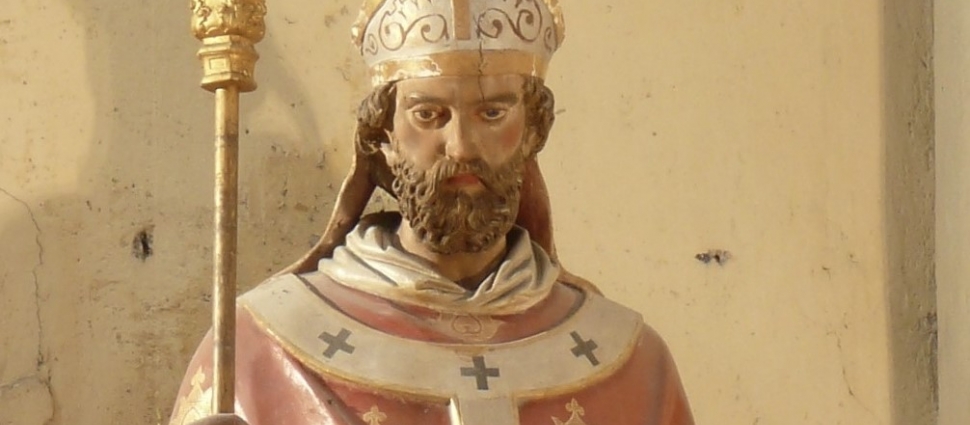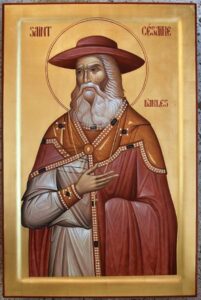
St. Caesarius of Arles was a great preacher, bishop and theologian of the early Church in Gaul (modern France). He was born at Châlons in Burgundy c. 470. This city is now known as Chalon-sur-Saône, located in eastern France. His parents were Gallo-Roman and were apparently of minimal Christian faith. Caesarius was greatly devoted to the Faith from his childhood, which caused family friction.
MONASTIC FORMATION
He left home at age seventeen and, after studying with a bishop, found his way to the eminent monastery at Lerins nearly four hundred miles away. There, over a period of about ten years, he became a monk, studied Holy Scripture, and mastered the pattern of monastic life. Because he was overzealous in his dietary and other penances, he was sent to Arles to physically recover. There, he became close friends with Bishop Eonus, who ordained him a deacon and then a priest. The Christian people there became very fond of him, and he had much success reforming a nearby monastery.
CALLED TO BE A SHEPHERD
When Eonus died in 502, Caesarius was elected by popular decree, which had been recommended by the Bishop himself, but against Caesarius’s wishes. He was installed in 503, and promptly began to dedicate his life to the people entrusted to him. It was a time of turmoil with wars in southern Gaul among Visigoths, Ostrogoths, Burgundians, and Franks. These ongoing skirmishes resulted in numerous war captives. Bishop Caesarius was well known to ransom the captives, a constant and costly struggle. Once the violence subsided, the peasants endured terrible deprivations, and their bishop provided for the suffering people. Twice, he was exiled or imprisoned due to political intrigue among the antagonistic kingdoms of Burgundians and the Ostrogoth King Theodoric. Both times, he was proven to be innocent. He met King Theodoric in Ravenna in 513, and the king was deeply impressed with the good bishop. Caesarius traveled to Rome to visit Pope Symmachus, who bestowed on him a pallium, indicating that he was then a metropolitan or archbishop for Southern Gaul.
REFORMING BISHOP

As Bishop, Caesarius was a reformer. He required that the Divine Office be chanted in the churches of Arles each day. This ancient practice was a recitation of prayers at fixed times each day, offered by priests and consecrated religious. He published a version of Roman law suitable for the time and place. This work, known as Breviarium Alarici, was eventually established for the peaceful order of civil society. He collected and compiled canon law writings from earlier centuries, which provided a unique compendium of life in the early Western Church. It was called the Statuta Ecclesiae Antiqua, and it served the important purpose of establishing a moral code for clergy and laity, as well as for monastic life. Caesarius was a contemporary of the great pioneer of Western Monasticism, [St.] Benedict of Nursia, so there was not yet a standard moral code for monastic life in order to provide for its stability. Most of all, Caesarius was known for his effective preaching. More than two hundred of his sermons still exist, and they reveal a man who was deeply devoted to the salvation of souls at a time when the mighty Roman Empire was slowly collapsing. Similar to the preaching of Our Lord, Caesarius used examples of everyday life: agriculture, seafaring, care for livestock, and the marketplace. He was a great moral teacher, preaching the reality of heaven and hell and condemning common pagan practices of marital infidelity, greed, drunkenness and abuse of the poor, as well as indifference toward the life-giving Sacraments of Christ’s Church. He composed a Rule for women religious, encouraging the practice of enclosure (cloistration), rejection of all earthly finery and living modestly. He built a convent for women near Arles that was governed by his sister [St.] Caesaria, and which contained more than two hundred nuns at the time of his death. Bishop Caesarius died August 27, 536 at St. John’s Convent.
St. Caesarius of Arles was the most respected bishop of his time in Gaul, known for his benevolence, holiness, and wisdom. He was greatly influenced by the teachings of Sts. Augustine, the prototype for a monk-turned-bishop; and John Cassian, who in the previous century brought the ways of the desert monastic fathers to Marseilles, just several dozen miles from Arles. He advocated for priests to preach frequently as a way to educate the people about important moral issues. He also taught that bishops should live simply as monks do, shunning such things as opulent banquets and palatial estates. A beautiful reliquary of his remains can be found at St. Trophime in Arles. His feast day is August 27.
